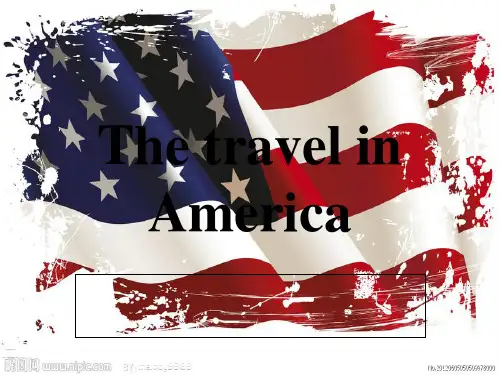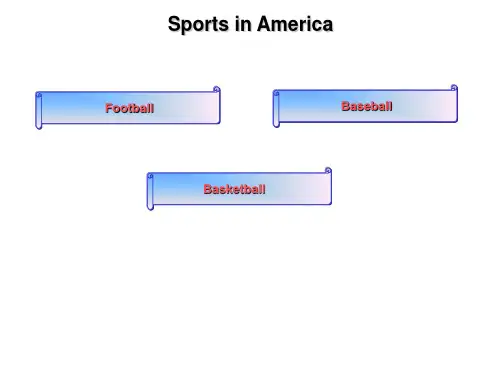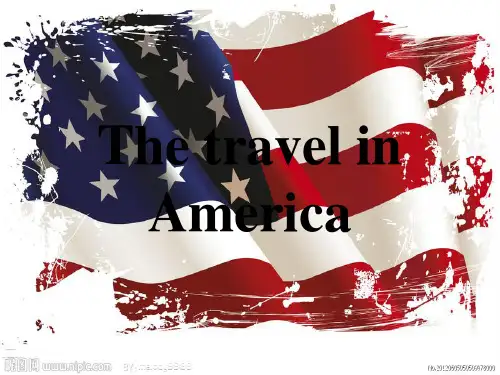- 1、下载文档前请自行甄别文档内容的完整性,平台不提供额外的编辑、内容补充、找答案等附加服务。
- 2、"仅部分预览"的文档,不可在线预览部分如存在完整性等问题,可反馈申请退款(可完整预览的文档不适用该条件!)。
- 3、如文档侵犯您的权益,请联系客服反馈,我们会尽快为您处理(人工客服工作时间:9:00-18:30)。
Work & Competitiveness
• “’He’s a hard worker,’ one American might say in praise of another. Or, ‘She gets the job done.’ These expressions convey the typical U.S. American’s admiration for a person who approaches a task conscientiously and persistently, seeing it through to a successful conclusion. More than that, these expressions convey an admiration for achievers, people whose lives center on accomplishing some physical, measurable task. Social psychologists use the term achievement motivationto describe people who place a high value on getting things done.” (p. 21) • “While the so-called ‘Protestant work ethic’ may have lost some of its hold on Americans, there is still a strong belief that the ideal person is a hard worker. A hard worker is one who ‘gets right to work’ on a task, works efficiently, and completes the task in a timely way that meets reasonably high standards of quality.” (p. 22)
Materi, three-quarters of incoming university students in the United States have told pollsters that earning “a lot of money” was a ‘very important’ goal for them.” (p. 23) • Regardless of income, Americans tend to spend money rather freely on material goods. Items that they once considered luxuries, such as personal electronic devices, large-screen television sets, cellular telephones, and electric garage-door openers are now considered necessities. Credit cards, which are widely available even to teenagers, encourage spending, and of course the scale and scope of the advertising industry is well known.
Privacy
• “Also closely associated with the value they place on individualism is the importance Americans assign to privacy. U.S. Americans tend to assume that most people “need some time to themselves” or “some time alone” to think about things or recover their spent psychological energy. Most Americans have great difficulty understanding people who always want to be with another person, who dislike being alone. Americans tend to regard such people as weak or dependent.” (p. 11) • “Americans’ attitudes about privacy can be difficult for people from other countries to understand. For example, Americans will often give visitors a tour of their house, including the bedrooms, which people from many other places consider private. They may speak quite openly, even to strangers, about personal or family problems that would be kept confidential elsewhere. Yet, in Americans’ minds, there are boundaries that other people are simply not supposed to cross. When such boundaries are crossed, the Americans’ bodies will visibly stiffen and their manner will become cool and aloof.” • “On the other hand, users of the social-networking site Facebook will often reveal information about themselves that, outside the environment of a computer network, they would probably keep to themselves.” (p. 12)
Rule of Law & Fair Play
• “The belief in the rule of law goes beyond the realm of politics to other areas of life that are governed by formal rules and procedures. Getting a job with a government agency, for example, or getting a government grant for a research project entails following published procedures and demonstrating that one meets the published requirements. Theoretically, personal connections do not matter under the rule of law.” (p. 68) • “In practice, personal contacts, wealth, and social influence often do matter where laws and rules are concerned. What we have said here describes the ideal to which Americans subscribe. In reality, connections sometimes do help a person get a government job.” (p.68)
Western Culture
(American Culture)
• Individualism • Privacy • Equality • Informality • Work & Competitiveness • Materialism • Rule of Law & Fair Play
Individualism
Equality
• “Americans are also distinctive in the degree to which they believe in the ideal, as stated in their Declaration of Independence, that “all men are created equal.” Although they sometimes violate the ideal in their daily lives, particularly in matters of interracial relationships and sometimes relationships among people from different social classes, U.S. Americans have a deep faith that in some fundamental way all people (at least all American people) are of equal value, that no one is born superior to anyone else.” (p12)
• “The most important thing to understand about Americans is probably their devotion to individualism. They are trained from very early in their lives to consider themselves as separate individuals who are responsible for their own situations in life and their own destinies. They are not trained to see themselves as members of a close-knit, interdependent family, religious group, tribe, nation, or any other collective.” (American Ways, Chapter 1, p. 5) • “Research by social scientists indicates that the culture of the United States is among the most individualistic in the world.” (p. 6) • “The individual that Americans idealize prefers an atmosphere of freedom, where neither the government nor any other external force or agency dictates what the individual does. For Americans, the idea of individual freedom has strong, positive connotations.” (7-8)










